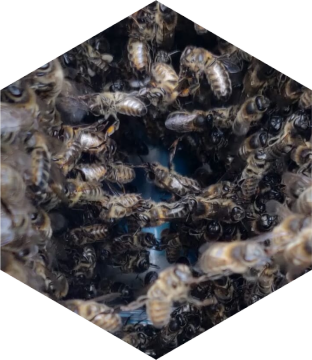…
Apitherapy is the use of substances from honeybees for human disease prevention and treatment. Bees work to gather and produce many products from the hive. The information below is not medical advise; health benefits are based on traditional and anecdotal accounts. Raw honey should never be given to an infant less than a year old.
- Honey (from foraged nectar)
- Wax (secretion from glands)
- Pollen (foraged from flowers)
- Propolis (from foraged tree resin)
- Venom (bee stings)
- Royal jelly (secretion from glands)
Foraging.
Honeybees forage in nature for:
Nectar: (for converting into honey). Raw honey is rich in nutrients & antioxidants. Honey has been used for coughs, regulating blood pressure & heart health. Raw unprocessed honey consumed is a source of antioxidants. Crystallized honey, such as ivy & heather are considered to better for your health than run honey. Ivy honey is collected by honey bees in autumn and into the winter. Honey is also an antiseptic, topical honey treatment has a long history of being used to heal skin wounds and burns. Raw honey should never be given to an infant less than a year old.
Pollen: (for making bee bread). Bees collect pollen and preserve it as bee bread. Bee bread as a high nutritional value and is rich in antioxidants which can strengthen immunity.
Resin: (for making propolis) Propolis may improve cholesterol levels. It is also used to ease tooth aches and mouth sores.
Secretion.
Beeswax: Worker bees secrete wax through their glands. Bees use the wax to build hexagonal cells (honeycomb). There they store pollen & honey. The queen lays eggs in comb cells also, and the bee larvae develop there. Beeswax has anti-fungal and antibacterial properties. Beeswax extracts may offer protection against fungi and disease-causing bacteria. Beeswax candles burn for longer than paraffin or soy candles, they also burn cleanly producing no soot.
Royal Jelly: Royal jelly is a honey bee secretion that is used in the nutrition of larvae. It is secreted from glands of nurse bees, and fed to the larvae in the colony. Royal jelly is highly nutritious and is considered to have antibacterial, antioxidant, and anti-inflammatory properties. Royal Jelly can be consumed orally or applied directly to the skin.
Bee venom.
Bee stings can be administered direct from the bee via a sting or collected from the bees by sponge or glass plate.
It is believed that bee venom (stings) has anti-inflammatory and pain-relieving capabilities.
Bee venom therapy has been used to help relieve pain from rheumatoid arthritis.
